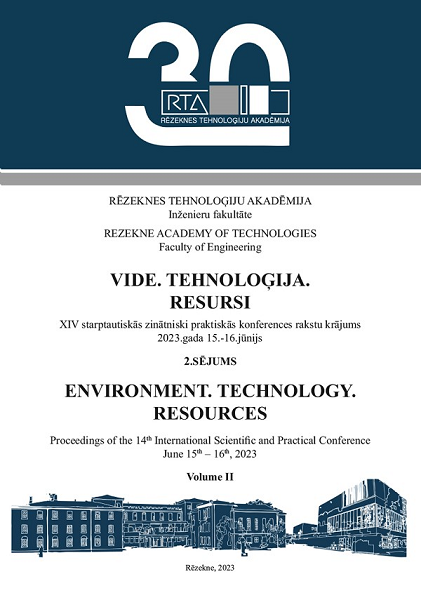SUBJECTIVE PROBABILITIES ELICITATION AND COMBINATION IN RISK ASSESSMENTS PROBLEMS
DOI:
https://doi.org/10.17770/etr2023vol2.7215Keywords:
risks, subjective probabilities elicitation, subjective probabilistic estimates combination, unfavourable event’s outcomesAbstract
Very many areas of human activity are associated with greater or lesser risks. In order to make reasonable decisions, these risks must be properly assessed. The consequences of any risk can be characterized on the basis of two fundamental dimensions (metrics): (1) losses associated with the outcomes of implementation an unfavourable event; (2) probabilities that quantify the uncertainties in the occurrence of these outcomes. This article in a concise form presents and analyses approaches to subjective probabilities elicitation and combining the obtained individual estimates in group subjective probabilities estimation.
References
I.L. Johanson, M. Rausand, "Foundation and choice of risk metrics," Safety Science, 62, pp. 386 – 399, 2014. https://doi.org/10.1016/j.ssci.2013.09.011
T. Aven, O.Renn, Risk Management and Governance. Springer-Verlag, Berlin, Heidelberg, 2010.
A. Šotić, R. Radenko, "The Review of the Definition of Risk," Online Journal of Applied Knowledge Management, Special Issue, 3 (3), pp. 17 – 26, 2015.
S.Kaplan, B.J.Garrick, "On The Quantitative Definition of Risk," Risk Analysis, 1 (1), pp. 11 – 27, 1981. https://doi.org/10.1111/j.1539-6924.1981.tb01350.x
"ISO 31010, Risk management – Risk assessment techniques," 2019.
"ISO 31000, Risk management – Guidelines," 2018.
"Expert Elicitation Task Force White Paper," U.S. Environmental Protection Agency, 149 p., 2011.
"Guidance on Expert Knowledge Elicitation in Food and Feed Safety Risk Assessment," EFSA Journal, 12 (6):3734, 2014. https://doi.org/10.2903/j.efsa.2014.3734
L.Beike, M. Soares, K. Claxton, A. Colson, A. Fox., C. Jackson, at al., "Developing a reference protocol for structured expert elicitation in health-care decision-making: a mixed-methods study," Health Technology Assessment, 25 (37), 162 p., 2021. https://doi.org/10.3310/hta25370
R. Budnitzo, G. Apostolakis, D.M. Boore, L.S. Cluff, K. Coppersmith, C.A. Cornell, P.A. Morris, "Recommendations for Probabilistic Seismic Hazard Analysis: Guidance on Uncertainty and Use Of Experts: Main Report," Lawrence Livermore National laboratories, 278 p.,1997. https://doi.org/10.2172/479072
S. Andersen, J. Fontain, G.W. Harrison, E.E. Rutström, Estimating Subjective Probabilities. Georgia State University, 37 p., 2013. DOI: 10.1007/s11166-014-9194-z
B.C. Wintle, H. Fraser, B.C. Wills, A.E. Nicholson, F. Fidler, "Verbal probabilities: Vary likely to be somewhat more confusions than number," Plos ONE, 14 (4), 19 p., 2019. https://doi.org/10.1371/journal.pone.0213522
K.-S. Chin, D.-W. Tang, J.-B. Yang, Sh.-Y. Wong, H. Wang, "Assessing new product development project risk by Bayesian network with a systematic probability generation methodology," Expert Systems with applications, 36, pp. 9879 – 9890, 2009. https://doi.org/10.1016/j.eswa.2009.02.019
T.L. Saaty, The analytic hierarchy process. New York, McGraw-Hill, 1980.
O. Uzhga-Rebrov, Uncertainties management. Part 1. Modern conceptions and applications of probability theory, Rēzekne, RA izdevniecība, 2004. (in Russian).
R.T. Clemen, R.L. Winkler, "Combining Probability Distributions From Expert in Risk Analysis," Risk Analysis, 19 (2), pp. 187 – 203, 1999.
R.E. Neapolitan, Probabilistic Reasoning in Expert Systems. Theory and Applications, John Wiley & Sons, Inc., New York, 1990.



